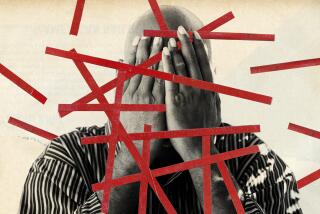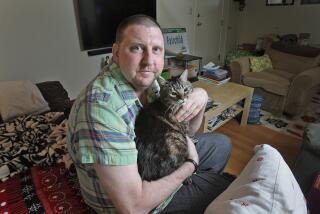Patient Has Absolute Right to Refuse It, Panel Rules : Court Halts Force-Feeding of Bouvia
- Share via
Quadriplegic Elizabeth Bouvia, who unsuccessfully sought court approval to starve herself to death in a hospital two years ago, has an absolute right to refuse force-feeding or any other unwanted medical treatment, “even if (it) creates a ‘life-threatening condition,’ ” a state appellate court ruled Wednesday.
In a powerfully worded, unanimous opinion, the 2nd District Court of Appeal ordered removal of a nasogastric tube through which doctors at High Desert Hospital in Lancaster have been feeding the 28-year-old woman.
Bouvia, who suffers from cerebral palsy and is unable to care for herself, has fought for removal of the tube since it was inserted against her will on Jan. 16. She filed suit to end the force-feeding a week later.
Los Angeles Superior Court Judge Warren Deering, concluding it was “fairly clear” that Bouvia had once again “formed an intent to die,” denied her request for an order to halt the tube feeding.
In overturning that decision, a three-judge appellate panel, with Justice Edwin Beach writing the 26-page opinion, accepted Deering’s judgment that Bouvia had formed an intent to die, but found it “immaterial.”
“A patient has the right to refuse any medical treatment or medical service, even when such treatment is labeled ‘furnishing nourishment and hydration,’ ” the justices held. Such a right is “basic and fundamental” and is “recognized as part of the right of privacy protected by both the state and federal constitutions.”
The lower court “seriously erred by basing its decision on the ‘motives’ behind Elizabeth Bouvia’s decision to exercise her rights. If a right exists, it matters not what ‘motivates’ its exercise,” Beach wrote.
On the decision to refuse unwanted medical treatment, the justices said:
“It is not a medical decision for her physicians to make. Neither is it a legal question whose soundness is to be resolved by lawyers or judges. It is not a conditional right subject to approval by ethics committees or courts of law. It is a moral and philosophical decision that, being a competent adult, is hers alone.”
Justice Lynn D. Compton wrote even more forcefully in a concurring opinion:
“Whatever choice Elizabeth Bouvia may ultimately make, I can only hope that her courage, persistence and example will cause our society to deal realistically with the plight of those unfortunate individuals to whom death beckons as a welcome respite from suffering,” Compton wrote.
“If there is ever a time when we ought to be able to get the ‘government off our backs’ it is when we face death--either by choice or otherwise.”
Lawyers for the Los Angeles County-operated hospital have 10 days in which to appeal the ruling to the California Supreme Court. “That’s up to the doctors and we haven’t decided anything yet,” Daniel D. Mikesell Jr., senior deputy county counsel, said.
“We are concerned with some of the things in the opinion, but we will talk to our clients (doctors and staff of the hospital) tomorrow. They did have ethical problems (about) watching her die.”
Relieved and Happy
Bouvia, who says she has not changed her mind about wanting to die but no longer intends to starve herself, was “relieved and happy” on learning of the ruling, according to Richard Scott, who heads a team of volunteer American Civil Liberties Union lawyers representing Bouvia.
Another of Bouvia’s lawyers said it would probably take a day or two before the Superior Court issued its new order and the tube was removed.
Scott called the ruling “a pretty high-impact opinion,” adding: “It certainly makes it clear that the patient’s right to refuse treatment is not age-dependent, not disease-dependent, not nearness-to-death-dependent.”
The county’s Mikesell said, “This is the first opinion in the United States that has gone this far.
“The court was concerned about the quality of life. What does that mean? Does that mean that any person with a handicap, perhaps not as great as Elizabeth’s, can come into our hospital and try to do the same thing we believe she is doing? That is, trying to end her life by starvation?” he asked.
The opinion, signed by Presiding Justice Lester Roth and Justice Lynn Compton, as well as Beach, pointedly emphasized the quality of life over length of life.
Quantity Versus Quality
At one point it states that Deering, in concluding that Bouvia could expect to live 15 to 20 more years with sufficient feeding, “mistakenly attached undue importance to the amount of time possibly available . . . and failed to give equal weight and consideration for the quality of that life.”
“In Elizabeth Bouvia’s view, the quality of her life has been diminished to the point of hopelessness, uselessness, unenjoyability and frustration. She . . . may consider her existence meaningless.
“Here, if force-fed, (she) faces 15 to 20 years of a painful existence, endurable only by the constant administrations of morphine. Her condition is irreversible. There is no cure for her palsy or arthritis. (She) would have to be fed, cleaned, turned, bedded, toileted by others for 15 to 20 years! Although alert, bright, sensitive, perhaps even brave and feisty, she must lie immobile, unable to exist except through physical acts of others.
“It is incongruous, if not monstrous,” the opinion continues, “for medical practitioners to assert their right to preserve a life that someone else must live, or, more accurately, endure, for 15 to 20 years.”
The county lawyers had argued that doctors at High Desert Hospital, about 50 miles north of Los Angeles, initiated the tube feeding to avert a life-threatening situation. They had concluded that she could--but would not--eat solid food and insisted on an inadequate liquid diet as a means to “self-induced starvation.”
Constant Weight
But Scott countered that she had maintained fairly constant, if low, weight for more than a year on her liquid intake of 500 to 700 calories a day and is not trying to starve herself.
The appellate court found that it is “immaterial that the removal of the . . . tube will hasten or cause Bouvia’s eventual death. Being competent, she has the right to live out the remainder of her natural life in dignity and peace.”
In his concurring opinion, Compton said he felt “compelled to write separately and reflect on what I consider to be one of the real tragedies of this case, which is that Elizabeth Bouvia has had to go to such ends to obtain relief from her suffering.”
Bouvia “apparently has made a conscious and informed choice that she prefers death to continued existence in her helpless and, to her, intolerable condition. I believe she has an absolute right to effectuate this decision.”
This right, he wrote, “should include the ability to enlist assistance from others, including the medical profession, in making death as painless and quick as possible.”
Bouvia first gained wide attention with her death wish in 1983 when, as a patient in a Riverside hospital, she unsuccessfully asked a Superior Court judge to force the hospital to withhold nourishment while giving her routine hygienic care and painkillers.
Force-feeding was begun there and she lost further rounds in court as well as a bid for the California Supreme Court to consider her petition. She left the Riverside hospital early in 1984.
More to Read
Sign up for Essential California
The most important California stories and recommendations in your inbox every morning.
You may occasionally receive promotional content from the Los Angeles Times.













